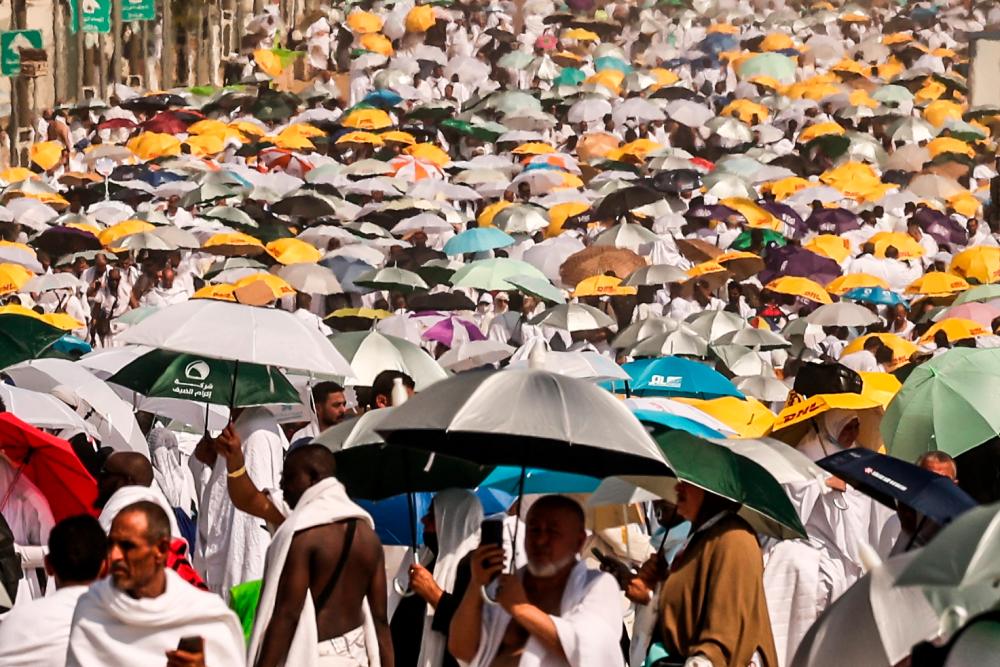RIYADH: A senior Saudi official defended the Gulf kingdom’s management of the hajj pilgrimage on Friday after various countries reported more than 1,100 deaths, many attributed to high heat.
“The state did not fail, but there was a misjudgement on the part of people who did not appreciate the risks,“ the official told AFP in the government’s first comments on the deaths.
An AFP tally on Friday, compiling official statements and reports from diplomats involved in the response, put the toll at 1,126, more than half of them from Egypt.
The senior Saudi official said the Saudi government had confirmed 577 deaths for the two busiest days of hajj: Saturday, when pilgrims gathered for hours of prayers in the blazing sun on Mount Arafat, and Sunday, when they participated in the “stoning of the devil” ritual in Mina.
“This happened amid difficult weather conditions and a very harsh temperature,“ the official said, while acknowledging that the 577 figure was partial and did not cover all of hajj, which formally ended on Wednesday.
The hajj is one of the five pillars of Islam, and all Muslims with the means must complete it at least once before they die.
Saudi officials had earlier said 1.8 million pilgrims took part this year, a similar total to last year, and that 1.6 million came from abroad.
- Permit-less pilgrims -
Hajj permits are allocated to countries on a quota system and distributed to individuals via a lottery.
Even for those who can obtain them, the steep costs spur many pilgrims to attempt the hajj without a permit, though they risk arrest and deportation if caught by Saudi security forces.
The irregular route, which can save pilgrims thousands of dollars, has become increasingly popular since 2019 when Saudi Arabia introduced a general tourism visa, making it easier to enter the Gulf kingdom.
Before this year’s hajj, Saudi officials said they had cleared more than 300,000 would-be pilgrims from Mecca who did not have hajj permits.
But later, the senior Saudi official said on Friday, “an order came from above that we allow people who arrived at the gates of the holy places” to participate.
“We can estimate the number of the unregistered pilgrims at around 400,000,“ the official said.
“Almost all of them from one nationality,“ the official added, an apparent reference to Egypt.
Arab diplomats told AFP earlier this week that Egyptians accounted for 658 deaths, 630 of them unregistered pilgrims.
A US State Department spokesman said on Friday tht “multiple” US citizens died in the hajj.
“We can confirm the deaths of multiple US citizens in Saudi Arabia”, the spokesman said, wihtout providing further details.
- Scorching temperatures -
The hajj, whose timing is determined by the Islamic lunar calendar, fell again this year during the scorching Saudi summer.
Temperatures reached 51.8 degrees Celsius (125 Fahrenheit) at the Grand Mosque in Mecca on Monday, according to the national meteorological centre.
Unregistered pilgrims did not have access to amenities meant to make the pilgrimage more bearable, including air-conditioned tents.
Unregistered Egyptian pilgrims told AFP this week that in some cases they struggled to access hospitals or hail ambulances for loved ones, some of whom ended up dying.
The pilgrims also said they could not access official hajj buses -- the only transportation around the holy sites -- without paying exorbitant, off-the-books fees.
Forced to walk for many kilometres under the blazing sun, some reported seeing motionless bodies on the roadside and pilgrims collapsing because of apparent exhaustion.
The senior Saudi official told AFP on Friday that there was no blanket ban on unregistered pilgrims using the buses.
“There is no ban on them using the buses but these buses are prepared for the registered pilgrims that we know are coming,“ the official said.
The unregistered pilgrims “walk along bus routes that are not set up with food or medical services like ambulances. It’s a highway for the buses.”









